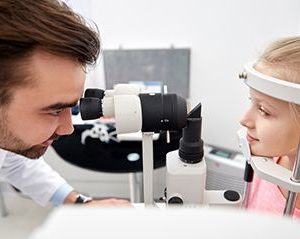- Recognizing the Signs of Hypothyroidism
- 10 Strategies to Overcome Insomnia
- Could Artificial Sweeteners Be Aging the Brain Faster?
- Techniques for Soothing Your Nervous System
- Does the Water in Your House Smell Funny? Here’s Why
- Can a Daily Dose of Apple Cider Vinegar Actually Aid Weight Loss?
- 6 Health Beverages That Can Actually Spike Your Blood Sugar
- Treatment Options for Social Anxiety Disorder
- Understanding the Connection Between Anxiety and Depression
- How Daily Prunes Can Influence Cholesterol and Inflammation
Even in a Pandemic, Child Vision Tests Are Crucial

It’s critical for parents to maintain their children’s vision checkups during the COVID-19 pandemic, an expert says.
“All children should have their eyes checked by their pediatrician at regular intervals, even if they don’t have any symptoms,” said Dr. Samantha Feldman, a pediatric ophthalmologist at the Krieger Eye Institute in Baltimore.
“Part of the reason that vision screening is so important is because it gives us the opportunity to detect and treat patients that otherwise may be at risk of permanent and lifelong visual disability,” she said in a LifeBridge Health news release.
Screening is necessary because your child may not be able to describe vision problems to you.
“They might not even know their eyesight isn’t normal because it might be normal for them,” Feldman said. “So, it’s really important to get these screenings done to find the problems that could be easily missed.”
It’s important to detect early signs of vision problems before children become teenagers and adults because problems in developing eyes may still be correctable in the first five to seven years of life.
Medical offices have introduced COVID-19 safety protocols for in-person visits. Measures include taking patients’ temperatures, asking screening questions about their symptoms before they enter the office area, and spacing out seats in waiting areas, Feldman noted.
To help you feel more comfortable, ask your doctor’s office about safety procedures they have in place before you make an appointment.
If a pediatrician suspects that your child has a vision problem, they will refer the child to a pediatric ophthalmologist for further testing.
Children should be referred to an ophthalmologist if they have signs of misaligned eyes (strabismus), refractive errors (myopia, hyperopia, astigmatism) that can lead to poor vision, certain systemic diseases or a family history of eye disease, among other problems, according to Feldman.
Notify your health care provider if you think you have COVID-19 and follow their instructions.
More information
The American Academy of Pediatrics has more on vision screenings.
SOURCE: LifeBridge Health, news release, March 11, 2021
Source: HealthDay
Copyright © 2026 HealthDay. All rights reserved.










